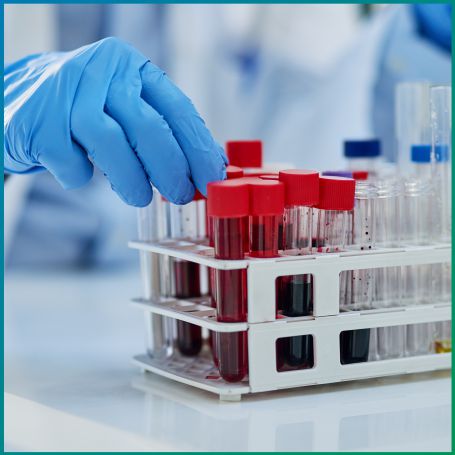
The AFB Drug Sensitivity Test is crucial for diagnosing and managing tuberculosis (TB), especially in cases where drug resistance is suspected.


This test determines whether the bacteria causing TB (Mycobacterium tuberculosis) are resistant to first-line and second-line anti-TB medications. Understanding the sensitivity of the bacteria to these drugs is vital for effective treatment and prevention of multidrug-resistant TB (MDR-TB) and extensively drug-resistant TB (XDR-TB).
The AFB Drug Sensitivity Test is a laboratory procedure used to determine whether Mycobacterium tuberculosis, the bacteria that causes TB, is resistant or sensitive to various anti-TB drugs. The test is performed after an AFB culture, where the bacteria are grown in a special medium to observe their response to drugs. There are two types of drug sensitivity testing:
First-line drug sensitivity testing: This tests the bacteria's resistance to the primary drugs used to treat TB, including isoniazid (INH), rifampicin (RIF), ethambutol, and pyrazinamide.
Second-line drug sensitivity testing: This is done if the bacteria are resistant to first-line drugs. Second-line drugs include fluoroquinolones (levofloxacin, moxifloxacin) and injectable drugs like amikacin, kanamycin, and capreomycin.
The importance of the AFB Drug Sensitivity Test lies in its ability to guide effective TB treatment. TB is a major global health concern, and drug resistance poses a serious challenge in combating the disease. Drug sensitivity testing helps:
Identify drug-resistant TB strains: The test identifies whether the bacteria are resistant to one or more first-line drugs, which is crucial for preventing the development of MDR-TB and XDR-TB.
Optimize treatment plans: Based on the test results, doctors can tailor the treatment to include drugs that are effective against the specific strain of bacteria, avoiding unnecessary medications and side effects.
Monitor treatment effectiveness: Drug sensitivity testing can be repeated during treatment to ensure the bacteria are responding to the prescribed medication.
The AFB Drug Sensitivity Test is recommended for individuals who: Have been diagnosed with TB but are not responding to treatment: If you have been on anti-TB medication and your condition is not improving, you may have drug-resistant TB. Test positive for TB with a history of incomplete or interrupted treatment: Individuals who did not complete their TB treatment in the past are at higher risk of developing drug-resistant strains of TB. Are in close contact with someone diagnosed with MDR-TB: If you have been exposed to someone with drug-resistant TB, your doctor may recommend a drug sensitivity test to rule out resistant strains. Have previously had MDR-TB or XDR-TB: Patients who have had drug-resistant TB in the past may need to be retested to ensure they do not have a recurrence of drug-resistant bacteria. Live in areas with high rates of MDR-TB: Individuals living in regions with high MDR-TB prevalence should consider drug sensitivity testing if they develop TB symptoms.
Choosing Diagnopein for your AFB Drug Sensitivity Test in Pune comes with several benefits:
A) Comprehensive Testing: At Diagnopein, we offer both first-line and second-line drug sensitivity testing to ensure that your treatment plan is optimized for maximum effectiveness.
B) Advanced Laboratory Facilities: We use advanced technology to perform drug sensitivity tests, ensuring accurate and reliable results.
C) Expert Pathologists: Our team of highly qualified pathologists and microbiologists specializes in TB diagnostics, providing in-depth analysis of your test results.
D) Quick Results: We understand the urgency of TB diagnosis and treatment, so we provide test results in a timely manner, helping patients start the appropriate treatment as soon as possible.
E) Affordable Pricing: Diagnopein in Pune is committed to offering affordable diagnostic services without compromising on quality. Our AFB Drug Sensitivity Test is competitively priced, making it accessible to all patients in need.
If your bacteria are resistant to first-line drugs, your doctor will recommend second-line drugs based on the drug sensitivity test results. Treatment for MDR-TB and XDR-TB can be longer and may require different combinations of medications.
First-line drugs are the primary medications used to treat TB, including isoniazid, rifampicin, ethambutol, and pyrazinamide. Second-line drugs are used when the bacteria are resistant to first-line drugs and include fluoroquinolones and injectable drugs like amikacin and kanamycin.
The test is performed by culturing Mycobacterium tuberculosis from a patient's sample (such as sputum) and then exposing the bacteria to different TB drugs in the lab. The bacteria's response to the drugs is observed to determine whether they are sensitive or resistant.
The test can take anywhere from a few days to several weeks, depending on the growth rate of the bacteria and the type of testing method used. At Diagnopein, we strive to provide timely results to help start treatment as soon as possible.